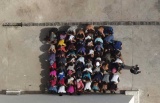
Resources for Dart Award Winner


The Landlord & the Tenant
A young mother rents a house in West Allis. The previous tenant tells her, "Baby, they shouldn't have let you move in."

Reporting Advice from Ian Urbina and Joe Sexton: 2022 Dart Award Honorees
Reporting Advice from Ian Urbina and Joe Sexton from The Outlaw Ocean Project

Disease, Inequity and Resilience in South L.A.
The judging panel commended the reporting team for shining a light on “compounding tragedies and unfairnesses,” and putting together a “riveting package” of “love and loss in the face of adversity.” They praised Joe Mozingo for the “depth” of his reporting, and for “refusing to describe his subjects as ‘victims,’” instead portraying them “as warriors who are fighting hard battles, whether it's against the ravages of COVID-19 or structural racism.” They hailed the “compassion, care and visual power” of Francine Orr’s photography, saying it’s “clear how hard the reporting duo worked to gain the trust of the hospitals and their sources,” depicting “heroes of stories that are about survival.” Originally published by The Los Angeles Times between February and December, 2021.

A Feast for Lost Souls
The judges described A Feast for Lost Souls as a “deeply moving piece” that “stirs our collective empathy” and “gives voice to the unspeakable.” They praised writer Annelise Jolley and photographer Zahara Gómez Lucini for “letting their subjects grieve and breathe in their own time” and for providing the reader with a “real connection to their pain.” They applauded the team’s “exquisite attention to even the smallest of details,” and for respectfully shining a light on these “resilient, brilliant women” who possess "so much agency in the face of such devastation.” Originally published by The Atavist on November 30, 2021.

2021 Dart Awards: Reporting Tips from the Honorees
On September 30th, the 2021 Dart Awards honorees joined us for three roundtable conversations to discuss their craft, and approach to writing and reporting complex stories.

Lives Lost
Through the stories of 60 ordinary people across 20 countries, “Lives Lost” captures the scale of the covid-19 crisis, the impact of each death on those left behind, and how trauma has been playing out across communities, countries, and cultures. The judges described "Lives Lost” as an “astonishingly powerful,” “multi-layered” package that “reveals the devastating, global-scale loss that the virus has had on humanity.” The judges also commended AP for its “tremendous institutional commitment” to a “beautiful project of human portraits despite the onslaught of daily news." Originally published by the Associated Press on September 30, 2020.

Shake the Room
This episode of the Resistance podcast tells the story of a nearly six-hour standoff between Derrick Ingram and the NYPD, and explores the harrowing relationship between the police and protestors, and the impact of trauma on those fighting for racial justice and police reform. The judging panel described the piece as "brilliant and revelatory storytelling,” “at turns riveting, enraging, funny, and deeply moving.” They called it “spectacular,” and underscored the way it “depicts a kind of trauma -- menacing situations of indignity and harassment -- that far too many people of color in this country are familiar with.” Originally published by Gimlet and Spotify on October 21, 2020.

Unheard
This project focuses on 29 Alaskan women and men of different races and socio-economic backgrounds seeking to inspire change in Alaska’s justice system, and to de-stigmatize being a survivor of sexual violence. The judges called “Unheard” “exceptional, original journalism” that “puts the voices of survivors at the forefront” and “reimagines how trauma-aware, culturally-sensitive, collaborative reporting can be done.” They applauded the project’s “emphasis on the heterogeneity of sexual violence and trauma” and called the reporting approach “sensitive by design.” Originally published by the Anchorage Daily News and ProPublica on June 1, 2020.
Case Closed
This multipart series focuses on rape survivor Sandi Fedor’s efforts to track down the serial rapist who attacked her as she discovers that her trust has been betrayed by the indifference of an historically under-resourced Cleveland Police sex crimes unit. Judges praised the team for “successfully intertwining a visceral survivor’s point of view narrative with traditional investigative reporting.” They said the series “meticulously documents with photographs, video clips, audio recordings, public records, police documents, and prior investigative reporting” a “pattern of systemic police department failure dating back decades” which “enabled serial offenders like the man who attacked Sandi Fedor to evade justice for years.” Originally published in the Plain Dealer on September 29, 2019.